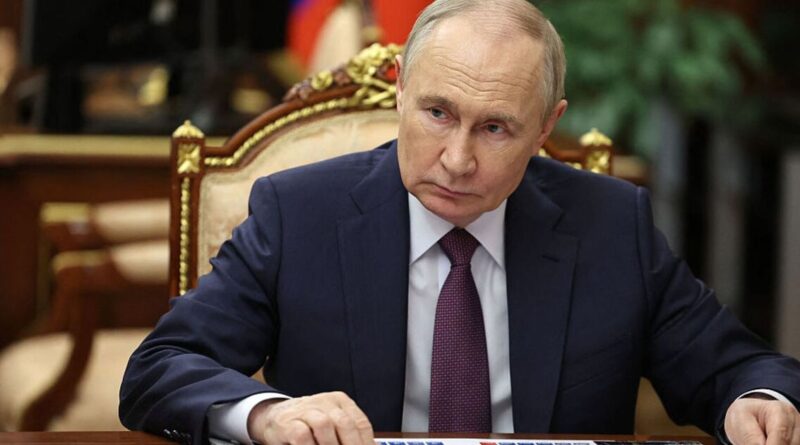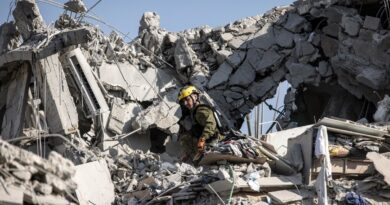Putin’s terrifying opportunity while world fixates on Israel-Iran war | World | News
While much of the world’s gaze is fixed on the escalating Iran–Israel crisis, it would be dangerously naïve to assume that the war in Ukraine is winding down. Quite the opposite, in fact. Beneath the radar of global headlines, Vladimir Putin has quietly intensified his campaign, launching one of the most sustained aerial assaults on Ukraine since the full-scale invasion began in 2022.
Over the weekend, Russia fired over 200 drones, cruise missiles, and ballistic missiles at Ukrainian cities and infrastructure — a brutal reminder that the Kremlin has not given up. The cities of Kyiv and Odesa bore the brunt, with up to 20 civilians reportedly killed and many more injured. Rescue teams are still combing through the rubble, and the true scale of destruction may yet grow.
NATO aircraft were scrambled over Poland in response — a country which, lest we forget, borders both Belarus and Russia’s militarised Kaliningrad enclave on the Baltic Sea.
These are not abstract dangers for Warsaw. The Poles — along with the Baltic states — understand the Russian threat better than most, having endured generations of occupation, subjugation, and intimidation. They will be watching these developments with growing alarm, as will NATO’s eastern flank more broadly.
So, does this escalation mean we are inching closer to direct war with Moscow? For now, I don’t believe so. But each fresh wave of missiles makes that prospect more plausible. It’s another ratchet on the tension scale, and one misstep — an errant missile landing on NATO soil, for instance — could be catastrophic.
The larger question is this: what is Putin trying to achieve?
The strategic picture is damning for Russia. Putin’s war — which was meant to topple the Ukrainian government in three days and install a pro-Russian regime — has failed spectacularly. Zelensky is still in office, and Ukraine remains fiercely independent. Far from seizing the whole country, Russian forces now occupy less than 20% of Ukrainian territory. Most of that is contested, bitterly defended kilometre by kilometre.
On the battlefield, the Russian military machine is a shadow of its former self. Its air force has been decimated. Its tank fleet is half what it was. Sanctions have throttled the economy and cut off access to key technologies.
Up to one million Russian casualties — killed, wounded, missing — is the reported toll, though exact numbers are impossible to verify. One thing is clear: this is not sustainable.
Putin knows it too. He knows this war is unwinnable. But he cannot stop. To end the war now would be to admit failure — not just to the world, but to his own people.
It would destroy the myth he has cultivated of Russian resurgence. Worse still, it might destroy him personally. Dictators rarely survive humiliation. Putin has built his regime on lies, fear, and personal authority. Take away the aura of success and control, and the whole edifice may collapse.
This, I believe, is why we’re seeing renewed aggression. It’s not strategy; it’s survival. Each missile strike, each mobilised conscript, is about buying time. The man in the Kremlin is not playing chess anymore — he’s simply trying not to be pushed off the board.
He fears assassination, and with good reason. Ukraine has shown it is capable of striking deep behind enemy lines — both physically and psychologically. Putin will now prioritise his own security above all else.
But history shows us that dictators rarely fall at the hands of foreign enemies; it is usually one of their own who slips the knife in. One day — maybe soon, maybe not — someone in his circle may decide the cost is too high and the lies too great. That day will be Putin’s undoing.
Until then, the war grinds on.
For Britain and our allies, this is a time for vigilance, unity, and resolve. We must not let the Iranian crisis distract us entirely from the struggle in Ukraine. One dictator lashing out in desperation is bad enough. Two acting in concert — with opportunism and timing — could be disastrous.
We must continue to support Ukraine materially, diplomatically, and morally. The frontline may lie east of the Dnipro River, but the stakes stretch across the continent. Freedom, order, and the rule of law are on the line.
And in the background, Putin is still watching, still scheming, and still hoping the West gets distracted just long enough for him to snatch a sliver of victory from the jaws of defeat.
We must not give him that chance.





